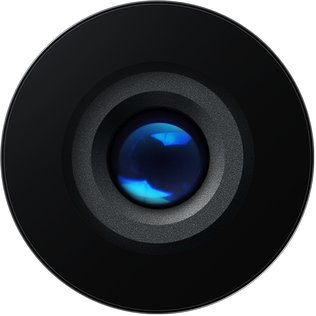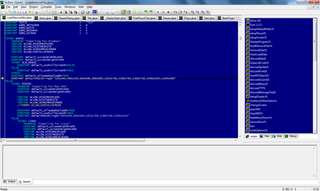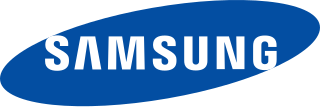Darwin is the core Unix-like operating system of macOS, iOS, watchOS, tvOS, iPadOS, audioOS, visionOS, and bridgeOS. It previously existed as an independent open-source operating system, first released by Apple Inc. in 2000. It is composed of code derived from NeXTSTEP, FreeBSD, other BSD operating systems, Mach, and other free software projects' code, as well as code developed by Apple.

iSight is a brand name used by Apple Inc. to refer to cameras on various devices. The name was originally used for the external iSight webcam, which retailed for US$149, connected to a computer via a FireWire cable, and came with a set of mounts to place it atop any then current Apple display, laptop computer, all-in-one desktop computer, or round surface.

iPodLinux is a μClinux-based Linux distribution designed specifically to run on Apple Inc.'s iPod. When the iPodLinux kernel is booted it takes the place of Apple's iPod operating system and automatically loads Podzilla, an alternative GUI and launcher for a number of additional included programs such as a video player, an image viewer, a command line shell, games, emulators for video game consoles, programming demos, and other experimental or occasionally unfinished software.

The iPod Touch is a discontinued line of iOS-based mobile devices designed and formerly marketed by Apple Inc. with a touchscreen-controlled user interface. As with other iPod models, the iPod Touch can be used as a portable media player and a handheld gaming device, but can also be used as a digital camera, a web browser, for email and messaging. It is nearly identical in design to the iPhone, and can run most iPhone third-party apps from the App Store, but it connects to the Internet only through Wi-Fi and uses no cellular network data, as it lacks a cellular modem.
A mobile operating system is an operating system used for smartphones, tablets, smartwatches, smartglasses, or other non-laptop personal mobile computing devices. While computers such as typical/mobile laptops are "mobile", the operating systems used on them are usually not considered mobile, as they were originally designed for desktop computers that historically did not have or need specific mobile features. This "fine line" distinguishing mobile and other forms has become blurred in recent years, due to the fact that newer devices have become smaller and more mobile, unlike the hardware of the past. Key notabilities blurring this line are the introduction of tablet computers, light laptops, and the hybridization of the two in 2-in-1 PCs.

iOS is a mobile operating system developed by Apple exclusively for its smartphones. It was unveiled in January 2007 for the first-generation iPhone, launched in June 2007.
iOS is a mobile operating system developed by Apple Inc. and was first released as iPhone OS in June 2007, coinciding with the launch of the first generation iPhone. iPhone OS was renamed iOS following the release of the iPad, starting with iOS 4. With iOS 13, Apple began offering a separate operating system, iPadOS, for the iPad. iOS is also the foundation of the newer audioOS and tvOS, and shares some of its code with macOS. New iOS versions are released every year alongside new iPhone models. From its launch in 2007 until 2010, this occurred in June or July, since then, new major versions are released in September or October. Since the launch of the iPhone in June 2007, there have been 17 major releases of iOS. The current major version of iOS is iOS 17, released on September 18, 2023.

GLBasic is a commercial BASIC programming language that can compile to various platforms including Windows, Linux, Mac OS X, and some handheld devices. The language is designed to be simple and intuitive.

A dock connector is an electrical connector used to attach a mobile device simultaneously to multiple external resources. Dock connectors typically carry a variety of signals and power, through a single connector, to simplify the process of docking the device. A dock connector may be embedded in a mechanical fixture used to support or align the mobile device or may be at the end of a cable.
iOS jailbreaking is the use of a privilege escalation exploit to remove software restrictions imposed by Apple on devices running iOS and iOS-based operating systems. It is typically done through a series of kernel patches. A jailbroken device typically permits root access within the operating system and provides the right to install software unavailable through the App Store. Different devices and versions are exploited with a variety of tools. Apple views jailbreaking as a violation of the end-user license agreement and strongly cautions device owners not to try to achieve root access through the exploitation of vulnerabilities.

Apple Inc. has produced and sold headphones since 2001, available for standalone purchase and bundled with iPhone and iPod products. Apple's current product line consists of EarPods, AirPods and AirPods Pro, and AirPods Max.

The Samsung Wave S8500 is a smartphone developed and produced by Samsung Electronics. It is the first smartphone to run the Bada operating system developed by Samsung Electronics, which was commercially released on May 24, 2010. The Wave is a touchscreen phone powered by Samsung's "Hummingbird" CPU (S5PC110), which includes 1 GHz ARM Cortex-A8 CPU and a built-in PowerVR SGX 540 graphics engine. It also has a "Super AMOLED" screen and 720p high-definition video capture capabilities. Due to shortage of Super AMOLED screens, Samsung released a successor to the device called Wave II and ceased production of the original S8500 model.

iOS 4 is the fourth major release of the iOS mobile operating system developed by Apple Inc., being the successor to iPhone OS 3. It was announced at the Apple Special Event on April 8, 2010, and released on June 21, 2010. iOS 4 was the first version branded as "iOS" rather than "iPhone OS", due to the release of the iPad. It was succeeded by iOS 5 on October 12, 2011.

FaceTime is a proprietary videotelephony product developed by Apple Inc. FaceTime is available on supported iOS mobile devices running iOS 4 and later and Mac computers that run Mac OS X 10.6.6 and later. FaceTime supports any iOS device with a forward-facing camera and any Mac computer equipped with a FaceTime Camera. FaceTime Audio, an audio-only version, is available on any iOS device that supports iOS 7 or newer, and any Mac with a forward-facing camera running OS X 10.9.2 and later.

AirPlay is a proprietary wireless communication protocol stack/suite developed by Apple Inc. that allows the streaming of multimedia and device screens, together with related metadata, between compatible devices. Originally implemented only in Apple's own software and hardware, the company has since licensed the AirPlay protocol stack to third-party manufacturers and it has been implemented on devices such as television sets and home audio systems. AirPlay works through either a direct peer-to-peer connection between devices or through an infrastructure local network.
greenpois0n is a name shared by a series of iOS jailbreaking tools developed by Chronic Dev Team that use exploits to remove software restrictions on iPhones, iPads, iPod Touches, and Apple TVs. Greenpois0n's initial release in October 2010 jailbroke iOS 4.1, and its second version in February 2011 jailbroke iOS 4.2.1 as well as iOS 4.2.6 on CDMA iPhones. The second generation of the tool, greenpois0n Absinthe, was developed with iPhone Dev Team members and jailbroke iOS 5.0.1 in January 2012, and a second version jailbroke iOS 5.1.1 in May 2012.

The first-generation iPod Touch, is a multi-touch mobile device designed and marketed by Apple Inc. with a touchscreen-based user interface. The first device of the iPod Touch series, it was unveiled and released at Apple's media event on September 5, 2007. It is compatible with up to iPhone OS 3.1.3 which was released on February 2, 2010.
The iPhone's hardware is designed by Apple Inc. Apple directly sub-contracts hardware production to external OEM companies, maintaining a high degree of control over the end product.
The Linux kernel can run on a variety of devices made by Apple, including devices where the unlocking of the bootloader is not possible with an official procedure, such as iPhones and iPads.












